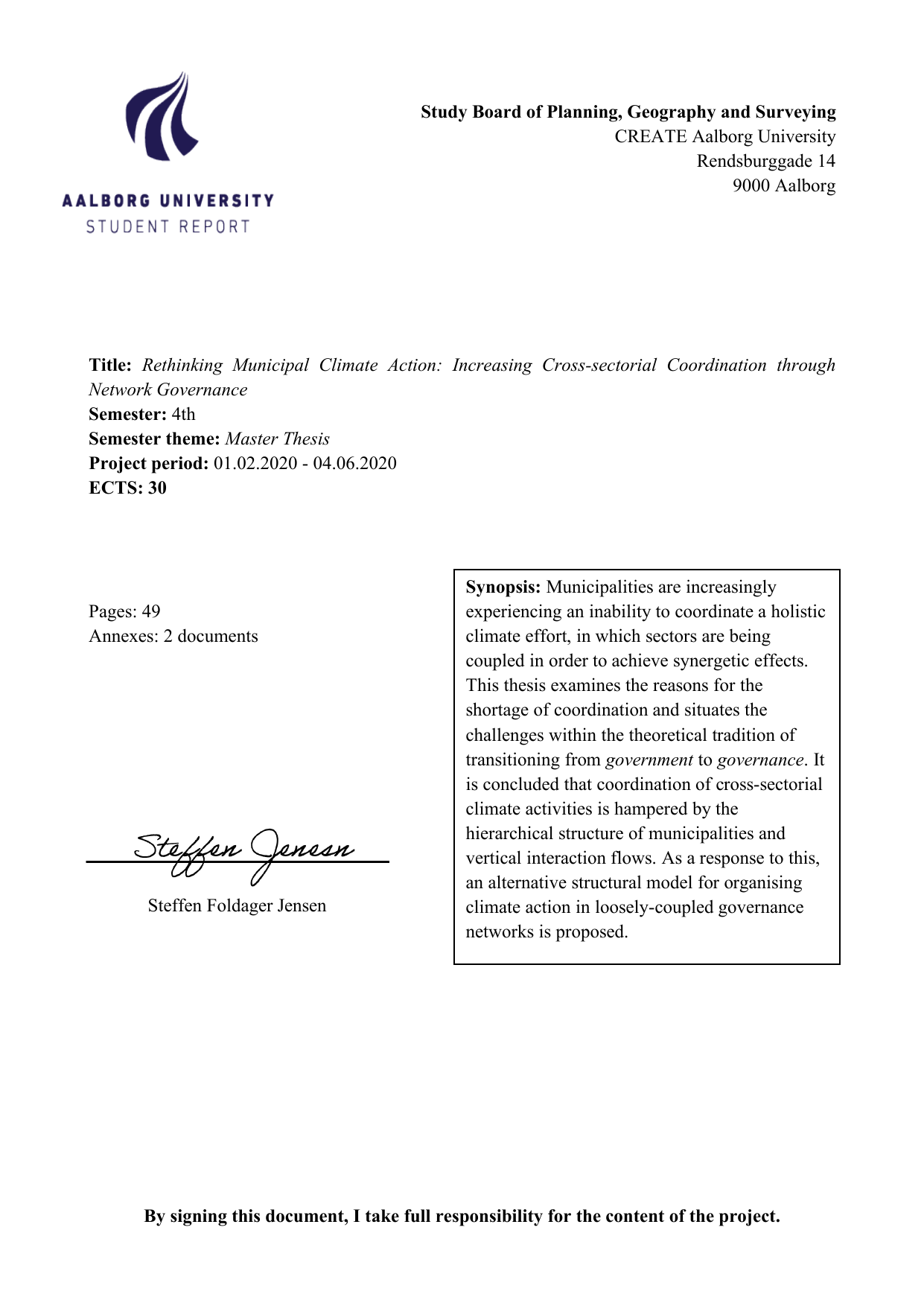
Rethinking Municipal Climate Action: Increasing Cross-sectorial Coordination through Network Governance
Author
Term
4. Term
Publication year
2020
Submitted on
2020-06-03
Pages
49
Abstract
Med forventningen om et stedse stigende ambitionsniveau for den kommunale klimaindsats, er det afgørende, at klimahandling forankres bredt i organisationen på tværs af forvaltninger og sektorer. På denne måde skabes en helhedsorienteret indsats, der udforsker potentialerne for synergiske klimagevinster. Kommuner oplever dog, at det stigende antal sideløbende klimaprojekter gør det vanskeligt at koordinere indsatsen i forhold til overordnede målsætninger og dermed vurdere, hvorvidt kommunerne er på rette spor. Med afsæt i denne udfordring søger dette specialeprojekt at afdække årsagerne til koordineringsunderskuddet og på baggrund heraf fremlægge løsningsforslag til at forbedre betingelserne for at koordinere en holistisk klimaindsats med et tværsektorielt fokus. Projektets empiriske genstandsfelt begrænser sig til fem nordjyske kommuner, hvori interviews med aktører på borgmester- og ledelsesniveau såvel som planlægningsniveau udgør projektets metodiske grundlag og former dets teoretiske rammer. Ved at placere projektet inden for traditionen, der beskæftiger sig med skiftet fra government til governance og den aktørcentrerede institutionalisme, rettes der fokus mod de strukturelle styringsmekanismer, som klimaplanlægningen underlægges. Det konkluderes, at overgangen fra vertikale interaktionsflows i hierarkiske organisationsstrukturer til større grader af horisontale partnerskaber i løst-koblede styringsnetværk vil tilføre samfundsstyringen den fornødne fleksibilitet, der kræves for at koordinere tværsektorielle klimaindsatser i en verden under konstant forandring.
As municipalities are increasingly expected to raise the level of ambition of their climate effort, it is vital that climate action pervades the entire organisation across departments and sectors. This way, a holistic climate effort is organised, in which synergetic climate potentials are explored. However, municipalities experience a lacking ability to coordinate a plurality of climate projects, which makes it difficult to assess the degree, to which the effort coheres with overall policy objectives. Using this challenge as a starting point, this thesis examines the reasons behind the shortage of coordination, on the ground of which suggestions are proposed to improve the conditions for coordinating a cross-sectorial climate effort. The empirical object is limited to five municipalities in Northern Jutland, in which a series of interviews with mayors and planners constructs a methodological foundation and shapes a theoretical framework. By positioning the project within the tradition of transitioning from government to governance and actor-centred institutionalism, focus is directed at the structural approach to steering. It is concluded that a transition from vertical interaction flows in hierarchical organisational structures towards horizontal collaborations in loosely-coupled governance networks would add flexibility to municipalities and enable them to coordinate a cross-sectorial climate effort in an ever-changing society.
Keywords
Documents
